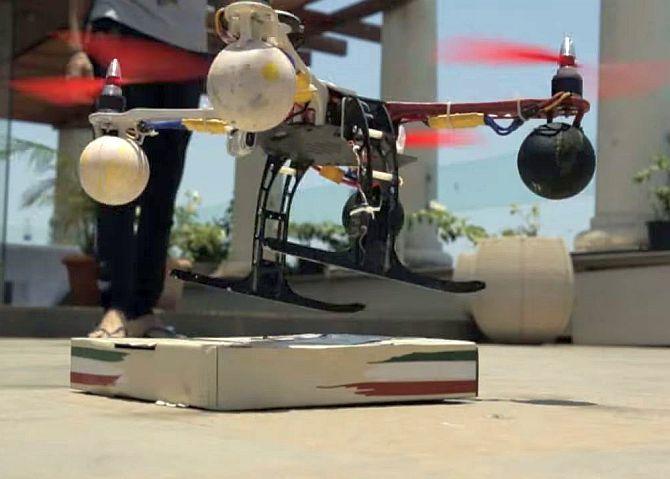India took the first step towards legalising drones by officially publishing draft rules for drone operations in the Official Gazette on Friday. The rules, termed The Unmanned Aircraft System Rules, 2020, are open for public consultation for 30 days.

In 2014, Francesco’s Pizzeria in Mumbai tried to deliver pizzas through drones. The first flight lasted 20 minutes, but within hours police arrived at the restaurant to question staff because they had no permission to fly the drone.
Six years later, India took the first step towards legalising drones by officially publishing draft rules for drone operations in the Official Gazette on Friday. The rules, termed The Unmanned Aircraft System Rules, 2020, are open for public consultation for 30 days.
According to the draft, unveiled by the Directorate General of Civil Aviation (DGCA), which will be the regulating authority for such vehicles, drones have been classified into five groups: Nano -- upto 250 grammes, micro (from 250 gm to 2 kg), small (2 kg to 25 kg), medium (25 kg to 150 kg), and large (greater than 150 kg).
The draft rules specify who will be allowed to manufacture, import, and operate drones and the airspace where these can be operated.
“Drone imports and drone corridors may be established in permitted areas. If warranted by the nature and requirement of the drone operations,” the draft rules say.
However, industry experts say it needs to be implemented soon.
Government officials say the Prime Minister’s Office and the NITI Aayog have called for increased focus on the industry, and the civil aviation ministry now has a special cell to look into it.
“What we now have is a draft legal framework for the industry. But, it is in the interest of all stakeholders to communicate with each other to implement these in a fast and efficient manner,” says Smit Shah, director partnerships, Drone Federation of India.
The federation was formed in 2017 and now counts India Inc biggies like Adanis, Tatas among its members along with over 2,000 start-ups.
Executives of these companies say the biggest hurdle is the ‘No Permission No Take Off’ (NPNT) protocol. Vipul Sinha, chief executive officer at Aarav Unmanned Systems, one of the few companies that manufactures and operates drones for state governments and security agencies, says 90 per cent of operators were deemed ineligible because of the policy. The policy says every type of drone should be approved by DGCA.
With negligible manufacturing capability within the country, 90 per cent of India’s drones have been manufactured by DJI Drones, which is based in Shenzhen, China.
To comply with NPNT, DJI has to tweak the hardware. However, it has refused to do so because the Indian market hasn’t shown numbers convincing enough for it to customise drones. Through a one-time registration window earlier this year, the government registered 19,553 drones.
“I would say the industry is going through a transition. Every transition brings in a set of challenges for a particular period. What has only changed is that now there is a clear-cut idea how you can operate, where you can operate and where you cannot operate. It also provides a very organised way of doing business,” Singh says.
A government official who is part of the Drone Cell in the government said the registration window allowed it to formalise the process. He says the committee overseeing India’s response to Covid-19 has been impressed by how drones helped combat the virus and locust swarms.
“Multiple options are being explored to streamline the process and make commercial usage of drones viable. On the hand, we are formalising the industry and trying to formulate rules for commercial usage,” the official says, pointing out approval given to firms like Zomato and Swiggy to test drones that are beyond visual line of sight (BVLOS). BVLOS flights are flown beyond the visual range.
“Nowhere in the world is delivery by drones allowed. India has taken the first step to enable that. We will collect data from these operations and frame policies based on that,” the official said.










